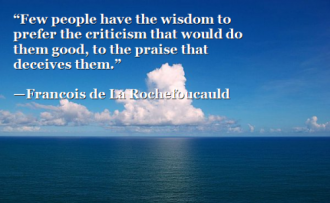CRITICISM - WHY WE NEED IT AND HOW IT HELPS US
Many take offense to advice when they don’t ask for it, including suggestions. Unsolicited advice can feel intrusive. It can threaten our personal space and privacy. There are also different degrees of criticism and advice, and the tone of delivery has lots to do with how well we can hear it. So does the nature of our relationship with the person from whom we receive it.
Criticism is another level of “advice,” which often comes with more punch and can push our buttons. However, I also invite us to consider criticism in a positive light, and if we don’t like its delivery, perhaps we can at least hear the core information — the helpful message — in the criticism. We also can ask for our needs — asking that criticism be delivered in a way that we’re better able to receive.
Style of delivery aside — be it angry, frustrated, insistent, blunt, etc. — let’s focus on the content of criticism.
First, when we get advice we often infer (it is not necessarily implied, meaning the rub is in the way that we think about it and emotionally react) that we are wrong, that our way of being is flawed, or even bad. This can be especially difficult if we have significant unresolved shame, meaning we judge and feel bad about our core sense of self.
Those of us interested in bettering ourselves appreciate criticism, and try to find something constructive in it. We might even try to sort through a difficult delivery of it because we want to learn and grow. Sometimes we might not like what we hear in criticism because it might be true, and this truth might cause us to see something we don’t like about ourselves or have to change somehow. The truth in criticism might also cause us to feel remorse, sadness, fear, or helpless; most are uncomfortable feeling these feelings and stave them off, thereby shooting down criticism or advice mid-air before it even makes it to our ears. Doing this can close us off to others and our own growth.
Third, we might associate criticism with childhood, when we were judged harshly or overly controlled. We then react to the present moment from a wounded place, that likely has little to do with what is currently happening. It’s reasonable not to want to be treated as we were when we were children. It’s even more reasonable, perhaps, to use critical awareness to recognize when we are having a knee-jerk childhood reaction, so that while it might seem we are being treated as children, it’s more honest to admit that we are reacting as a child. We can choose to see the current situation as adults and to respond from a more empowered and realistic sensibility.
Fourth, criticism is often associated with the shame and guilt of religion. We might feel the pain of how our parents or others wielded religious doctrines and used them as a way to violate our integrity. Some use religion to inflict condemnation and angry judgments. Yet the same religious precepts also can instill forgiveness, compassion, and wisdom. So, religion may not be to blame as much as the same core emotional wounds that cause some humans to wield religious doctrine as a sword of violence rather than as a compass for compassion.


No comments:
Post a Comment